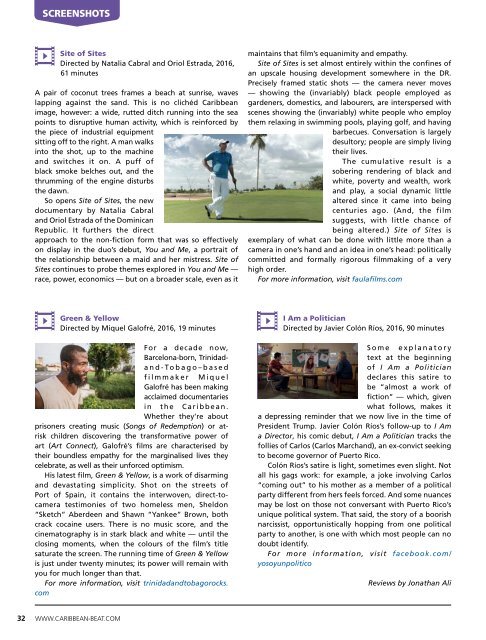Caribbean Beat — 25th Anniversary Edition — March/April 2017 (#144)
A calendar of events; music, film, and book reviews; travel features; people profiles, and much more.
A calendar of events; music, film, and book reviews; travel features; people profiles, and much more.
You also want an ePaper? Increase the reach of your titles
YUMPU automatically turns print PDFs into web optimized ePapers that Google loves.
SCREENSHOTS<br />
Site of Sites<br />
Directed by Natalia Cabral and Oriol Estrada, 2016,<br />
61 minutes<br />
A pair of coconut trees frames a beach at sunrise, waves<br />
lapping against the sand. This is no clichéd <strong>Caribbean</strong><br />
image, however: a wide, rutted ditch running into the sea<br />
points to disruptive human activity, which is reinforced by<br />
the piece of industrial equipment<br />
sitting off to the right. A man walks<br />
into the shot, up to the machine<br />
and switches it on. A puff of<br />
black smoke belches out, and the<br />
thrumming of the engine disturbs<br />
the dawn.<br />
So opens Site of Sites, the new<br />
documentary by Natalia Cabral<br />
and Oriol Estrada of the Dominican<br />
Republic. It furthers the direct<br />
approach to the non-fiction form that was so effectively<br />
on display in the duo’s debut, You and Me, a portrait of<br />
the relationship between a maid and her mistress. Site of<br />
Sites continues to probe themes explored in You and Me <strong>—</strong><br />
race, power, economics <strong>—</strong> but on a broader scale, even as it<br />
maintains that film’s equanimity and empathy.<br />
Site of Sites is set almost entirely within the confines of<br />
an upscale housing development somewhere in the DR.<br />
Precisely framed static shots <strong>—</strong> the camera never moves<br />
<strong>—</strong> showing the (invariably) black people employed as<br />
gardeners, domestics, and labourers, are interspersed with<br />
scenes showing the (invariably) white people who employ<br />
them relaxing in swimming pools, playing golf, and having<br />
barbecues. Conversation is largely<br />
desultory; people are simply living<br />
their lives.<br />
The cumulative result is a<br />
sobering rendering of black and<br />
white, poverty and wealth, work<br />
and play, a social dynamic little<br />
altered since it came into being<br />
centuries ago. (And, the film<br />
suggests, with little chance of<br />
being altered.) Site of Sites is<br />
exemplary of what can be done with little more than a<br />
camera in one’s hand and an idea in one’s head: politically<br />
committed and formally rigorous filmmaking of a very<br />
high order.<br />
For more information, visit faulafilms.com<br />
Green & Yellow<br />
Directed by Miquel Galofré, 2016, 19 minutes<br />
For a decade now,<br />
Barcelona-born, Trinidadand-Tobago–based<br />
filmmaker Miquel<br />
Galofré has been making<br />
acclaimed documentaries<br />
in the <strong>Caribbean</strong>.<br />
Whether they’re about<br />
prisoners creating music (Songs of Redemption) or atrisk<br />
children discovering the transformative power of<br />
art (Art Connect), Galofré’s films are characterised by<br />
their boundless empathy for the marginalised lives they<br />
celebrate, as well as their unforced optimism.<br />
His latest film, Green & Yellow, is a work of disarming<br />
and devastating simplicity. Shot on the streets of<br />
Port of Spain, it contains the interwoven, direct-tocamera<br />
testimonies of two homeless men, Sheldon<br />
“Sketch” Aberdeen and Shawn “Yankee” Brown, both<br />
crack cocaine users. There is no music score, and the<br />
cinematography is in stark black and white <strong>—</strong> until the<br />
closing moments, when the colours of the film’s title<br />
saturate the screen. The running time of Green & Yellow<br />
is just under twenty minutes; its power will remain with<br />
you for much longer than that.<br />
For more information, visit trinidadandtobagorocks.<br />
com<br />
I Am a Politician<br />
Directed by Javier Colón Ríos, 2016, 90 minutes<br />
Some explanatory<br />
text at the beginning<br />
of I Am a Politician<br />
declares this satire to<br />
be “almost a work of<br />
fiction” <strong>—</strong> which, given<br />
what follows, makes it<br />
a depressing reminder that we now live in the time of<br />
President Trump. Javier Colón Ríos’s follow-up to I Am<br />
a Director, his comic debut, I Am a Politician tracks the<br />
follies of Carlos (Carlos <strong>March</strong>and), an ex-convict seeking<br />
to become governor of Puerto Rico.<br />
Colón Ríos’s satire is light, sometimes even slight. Not<br />
all his gags work: for example, a joke involving Carlos<br />
“coming out” to his mother as a member of a political<br />
party different from hers feels forced. And some nuances<br />
may be lost on those not conversant with Puerto Rico’s<br />
unique political system. That said, the story of a boorish<br />
narcissist, opportunistically hopping from one political<br />
party to another, is one with which most people can no<br />
doubt identify.<br />
For more information, visit facebook.com/<br />
yosoyunpolitico<br />
Reviews by Jonathan Ali<br />
32 WWW.CARIBBEAN-BEAT.COM


















